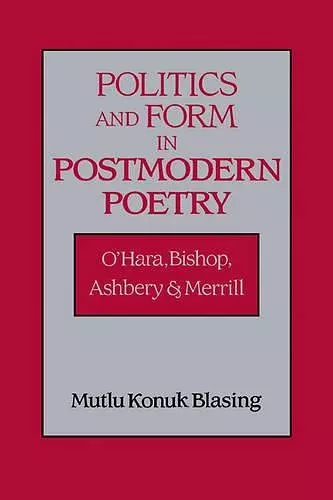Politics and Form in Postmodern Poetry
O'Hara, Bishop, Ashbery, and Merrill
Format:Paperback
Publisher:Cambridge University Press
Published:2nd Apr '09
Currently unavailable, and unfortunately no date known when it will be back
This paperback is available in another edition too:
- Hardback£90.00(9780521496070)

This study challenges the prevailing assumption that experimental forms of post-World War II poetry signify political opposition while traditional forms are politically conservative.
Approaching post-World War II poetry from a postmodern critical perspective, this study challenges the prevailing assumption that experimental forms signify political opposition while traditional forms are politically conservative.Approaching post-World War II poetry from a postmodern critical perspective, this study challenges the prevailing assumption that experimental forms signify political opposition while traditional forms are politically conservative. Such essentialist alignments of forms with extra-formal values, and the oppositional framework of innovation versus conservation that they yield, reflect modernist biases inappropriate for reading postwar poetry. Biasing defines postmodern poetry as a break with modernism's valorization of technique and its implicit collusion with technological progress. She shows that four major postwar poets - Frank O'Hara, Elizabeth Bishop, John Ashbery and James Merrill (two traditional and two experimental) - cannot be read as politically conservative because formally traditional or as culturally oppositional because formally experimental. All of these poets acknowledge that no one form is more natural than another, and no given form grants them a superior position for judging cultural and political arrangements. Their work plays an important cultural role precisely by revealing that meanings and values do not inhere in forms but are always and irreducibly rhetorical.
ISBN: 9780521106139
Dimensions: 229mm x 152mm x 14mm
Weight: 350g
236 pages